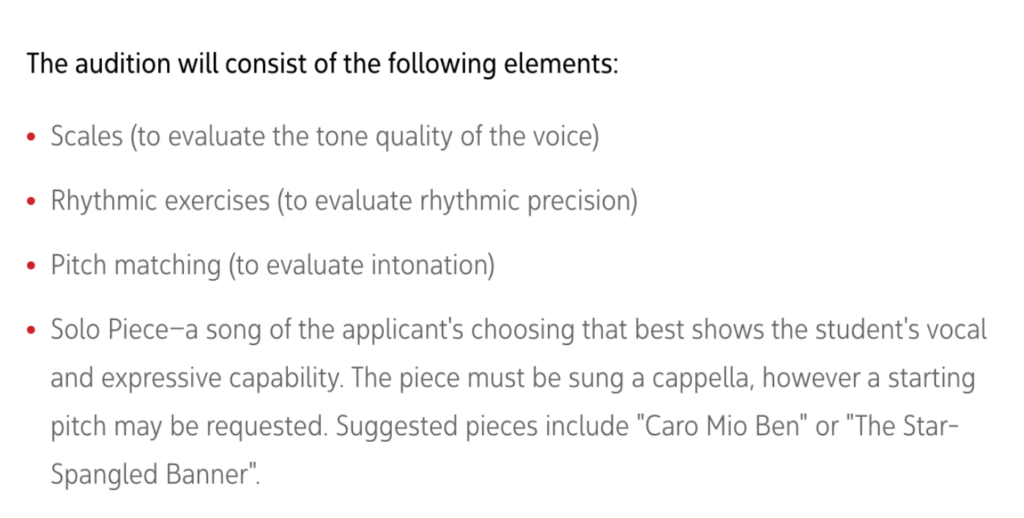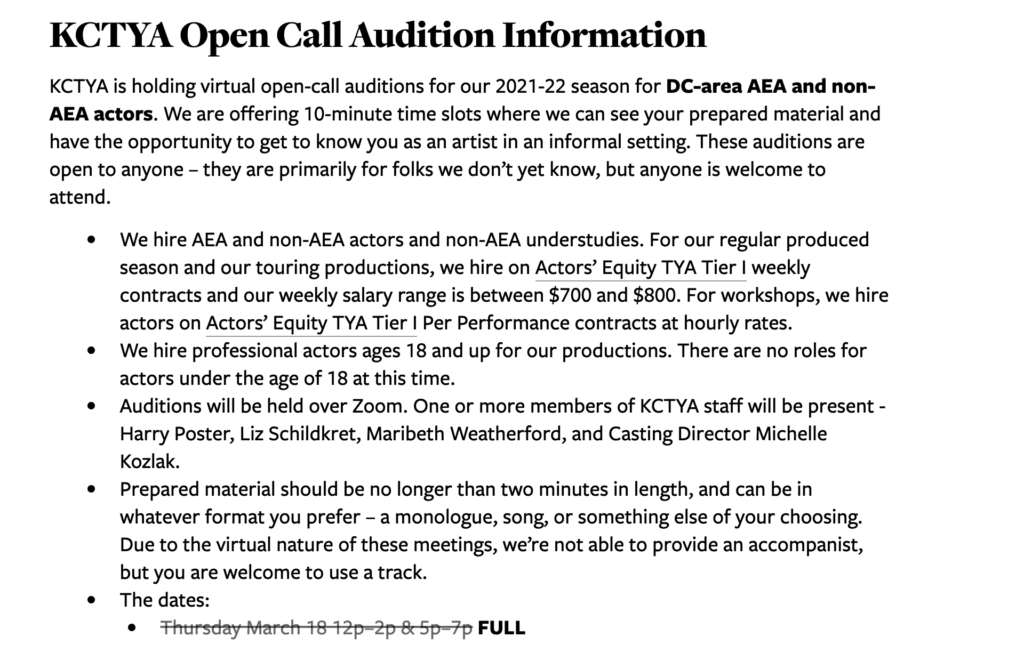At the moment with the Covid situation, there aren’t a ton of auditions for us to look at right now, but I do have a good feeling that in the fall or probably or late summer we’ll probably start auditioning again.
Whether that’s for a choir, school musicals, community theater, auditioning for an open mic night, there’s lots of different possibilities for things that you could have to audition for. So this is a kind of an overall that you can think about when you have to prepare for an audition.
Understand what the audition requirements are.
Every time you see an audition, you’re going to see a posting explaining what you need to have prepared. Sometimes the description is clear and sometimes they’re not very clear at all.
Example #1

This audition posting is for the National Children’s Choir Chorus. It’s pretty clear there. They tell you exactly what the audition is going to consist of:
- It says you’re going to have to sing scales, so there would be somebody playing piano for you.
- They’re going to have you clapping rhythms or like to sing rhythms and;
- They’re also going to have you pitch matching.
Usually that means that they’ll play the piano and you sing. It also means that they’ll probably have you do some kind of vocal exercises. It is very clear that you will have to sing a solo piece.
They want you to choose something that shows your vocal ability and the piece has to be sung a cappella(meaning you won’t be able to use a background .
That’s why they suggest Cara Mio Ben or The Star-Spangled Banner, because those are pretty straight forward songs to sing acapella.
Example #2

So the Kennedy Center has this thing called “Kennedy Center Theater for Young Audiences”. From this audition posting it’s never super clear what they’re really looking for at this audition.
- It says prepared material should be no longer than two minutes, so that gives us a pretty good idea of how long it needs to be.
- Can be in whatever format you prefer (that makes it a little bit less clear).
- A monologue song or something else of your choosing.
Basically they’re saying you can sing a song, and so that is kind of clear. But, you know, it’s not really saying like, we want you to sing a song for a musical. We want you to sing an opera aria. We want you to sing Star-Spangled Banner. It’s not it’s not very clear, so you’d have to kind of do some more digging on what they actually want.
Whenever you see posts like this, you want to read it in detail, read it multiple times, because usually there’s something that your eye won’t catch. I’ve actually read this probably five times and I just realized that it said the piece has to be sung a cappella, which makes a big difference.
Pick a song that will show off your range, style, and unique voice.
Put your best foot forward and your best voice forward on how you’re going to sound so that the people who are casting or the people who are deciding can really understand your voice. If you pick a song that does not show you off, you’re already kind of putting yourself at a disadvantage. They’re not going to be able to really understand like this is you. This is your voice. This is your range.
You also want to think about the style. Let’s just use the example of the children’s choir. That honestly is a very, very standard chorus audition posting. If you’re auditioning for a choir piece, you’re definitely not going to want to go and singing Beyonce. You definitely want to go in on something that maybe shows your range, shows your ability to blend, to sing, maybe not in a super classical way, but that you are able to sound like that, maybe not going to sound super poppy.
Whereas if you were auditioning for like American Idol or The Voice, you’d probably want to have a song that is a little bit more popular, probably not opera. Then you also want to pick a song that really shows off your uniqueness.
You want to pick a song that allows you to show off your range. You want a song that you’re really going to be able to show off your acting skills if you’re auditioning for a musical or something else.
If you’re auditioning for a specific role, you want to pick a song usually from a different musical, because usually the judges for the audition would say that they don’t want to hear songs from this musical.
For example, if you sing a song that’s similar to the song, then they could potentially see you as the person for the role which increases your chance of getting a callback and eventually getting the role.
One resource to help you find the right choice of song to sing if you are auditioning in a musical is TheatreTrip.com.
Have a cut prepared even if they don’t mention it in the audition posting.
Most singing auditions won’t have you sing the entire song and require you to make a cut. So be sure to have one ready. This is because the most interesting part of the song is in the middle part, the bridge or in the end. That is where the magic really happens. It’s the same case for pop songs, musical theatre, aria, etc.
How do you choose a cut?
A cut, means you’re going to pick a certain part of the song that your audition consists of. Most common cuts are 16 bars, 32 bars or a minute of a song. When choosing a cut ask yourself
“What shows off your range the best?” and “What part will be easy to come in on?” Don’t choose an obscure part. If you can choose a natural starting place like the beginning of a verse, chorus, or coda.
Accompaniment
If you are doing a virtual or Zoom audition, try to find a good accompaniment or karaoke track. You can also hire a pianist to make an audition track for you if you can’t find one.
If you are doing a live audition, bring the sheet music with you. If in any case, you forgot to bring one find a Fedex/UPS/Library to print it.
Prepare an audition binder beforehand. Your audition binder should be:
- Three hole punched
- Cuts clearly marked in colored – indicate where you start and where you stop.
- Also indicate if you need a note
- Mark tempo in BPM (beats per minute)
- Mark breaths
An important tip: Never put anything in your audition binder that you are not prepared to sing.
During the audition, the judges may ask you to sight sing, clap rhythms, sing an additional selection (always bring 2-3 JIC), and vocalize to test your range.
Go early at the audition site and be sure you have already warmed up.
Going early relieves you from the stress of having to do last minute preparations.
While most auditions are infamous for over and going late, being early makes a good impression for the judges. I suggest going there 2-3 minutes early from your time slot.
Make sure that you are already warmed up before arriving at the audition site. Most audition sites don’t have appropriate areas that will allow you to warm up. If ever there is one, it is mostly packed with people who are auditioning.
Bring extra copies of your resume or headshot.
Some judges will ask you if you have an additional copy of your resume or headshot, so make sure to have extra copies with you. It will keep you from being stressed out of having to print a copy if need be.
Dress your best.
How you dress in your audition really, really matters. Different kinds of auditions require different attire but look put together and make it appear that you are putting an effort to make a very good impression. If you ever have to wear jeans, make sure to pair it with a nice top. Do your research and put your best foot forward!
Audition starts the moment you walk into the room.
Even if they are auditioning multiple people at a time, the judges are still looking at you. Even if you’re not the one singing or just sitting in the audience and watch everyone sing, you are auditioning. Stay away from checking your phone, or fixing your hair, or appear unprepared. Be present showing off your good energy, good vibes, and all set to perform.
Introduce yourself properly.
Introducing yourself is another important part in the audition process because a lot of times, judges are interested to hear how you speak. Even if you have a good singing voice but you appear awkward when you speak, it will be a minus point for you. Appear calm and collected even if you are nervous. The easiest way to introduce yourself is
“Hi. My name [your name]. Today I will be singing [title of the song] by [composer] from [musical/opera if applicable].”
Speak with a clear voice and try to project because even if you are just speaking, it will help get your voice in gear before singing. Do you research and say the composer’s name properly. Know where the song came from that tells people that you did a background research of the piece you are going to sing.
Leave a Reply